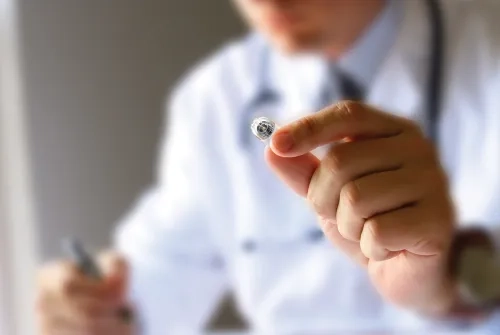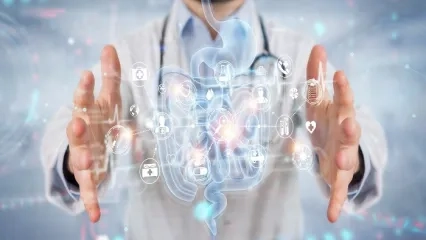Alo Yeditepe
Alo Yeditepe
Capsule Endoscopy
Capsule endoscopy is a type of examination performed to examine the entire digestive system, including the small intestine, which cannot be evaluated by gastroscopy and colonoscopy. The digital images obtained with the microchip inside the capsule are transferred to a recording device attached to the patient's waist (such as a radio) and examined in detail on the computer. The standard capsules take two images per second. Advanced capsules can capture up to 18 images per second and up to 50,000 images in 8 hours with an 8-fold magnification. With a very wide viewing angle, it can recognize objects up to 0.1 mm in diameter and texture up to 20 mm deep.
Images are Saved to the Microchip Inside the Capsule
Capsule endoscopy is a type of examination performed to examine the entire digestive system, including the small intestine, which cannot be evaluated by gastroscopy and colonoscopy. The digital images obtained with the microchip inside the capsule are transferred to a recording device (such as a radio) attached to the patient's waist and examined in detail on the computer. Standard capsules take two images per second. Advanced capsules, on the other hand, can take images at up to 18 images per second and around 50.000 images with 8 times magnification in 8 hours. It can recognize objects up to 0.1 mm in diameter and tissue up to 20 mm in depth, with a very wide viewing angle.
In Which Situations Is Capsule Endoscopy Applied?
- In the diagnosis of bleeding in the digestive system, the cause of which cannot be found, in determining the location of the bleeding
- In the diagnosis of Inflammatory Bowel Disease (Crohn's Disease)
- In the diagnosis of small intestine and digestive system cancers
- In the diagnosis of Celiac Disease; in Gluten Enteropathy; in the diagnosis of the disease and in monitoring the treatment
- In hereditary familial syndromes that may cause polyp development in the small intestine,
- In the screening of small intestinal polyps.
How to Prepare for Capsule Endoscopy?
One day before swallowing the capsule;
- Grainless and juicy foods should be consumed. All foods, including soups, should be liquid and grainless. For example, clear liquid foods such as boiled beef broth, or chicken broth (juice only), tea, coffee, compote juice (grainless), linden, and apple juice can be taken.
- Red-colored drinks such as cherry juice or pomegranate juice should not be preferred as they may give the appearance of blood during the examination.
- Intestinal cleansing by taking lapactic medication to improve image quality.
How is Capsule Endoscopy Performed?
Capsule swallowing is done on an empty stomach. The patient swallows the special capsule with a glass of water. Water can be drunk 2 hours after swallowing the capsule, and light juicy foods such as soup can be consumed 4 hours later. In the meantime, the patient can continue his/her daily life. After 8 hours, the recording device attached to the waist is removed under the control of the doctor. The capsule leaves the stomach in ± 50 minutes and passes from the small intestine to the first part of the large intestine (cecum) in about an hour. After an average of 24 hours, it is excreted after defecation with bowel movements.
Who is Not Suitable for Capsule Endoscopy?
It should not be administered to patients with known or suspected gastrointestinal obstruction or swallowing problems. It can be applied in patients with a pacemaker, provided that the heart rhythm is monitored.
This content was prepared by Yeditepe University Hospitals Medical Editorial Board.
”
See Also
- What is a Liver Transplant, How is it Done? and Who is it For?
- What is Constipation? What Helps With Constipation?
- What is Hepatitis B? What are its symptoms? How is it Transmitted?
- How to Cleanse the Liver the Fastest?
- Who Gets Colon Cancer?
- What is Colostrum? What are the Benefits of Colostrum Milk?
- Stomach Cancer Causes, Symptoms and Treatment
- What is Colon (Intestinal) Cancer? Symptoms and Treatment
- What Causes Nausea? What is Good for Nausea?
- What is Heartburn? What is Good for Heartburn?
- What is Fatty Liver?
- What is Good for Diarrhea? How to Treat Diarrhea?
- What is a Probiotic? What Are Its Benefits?
- What Is Reflux?
- Non-Surgical Treatment of Reflux
- What are the Nutrients That Stress Digestion?
- What are Capsule Treatment Methods in Stomach, Small, and Large Intestine Screening?
- Gastroenterology Procedures
- Pay Attention When Consuming These Nutrients!
- Mediterranean Diet Prevents Developing Colon Cancer!
- Breakthrough Innovations in Colon Cancer
- Diarrhea and Constipation Increased in Those with Irritable Stomach
- I Was Waking Up With Stomach Pain, I Fell Better After Endoscopic Fundoplication
- Anemia, Constipation, and Vomiting of Unknown Cause Can Be Dangerous
- As the Western Diet Increases, So Does Stomach Cancer
- Ramadan Warning for Those Who Experience Stomach Disorders
- Causes and Treatment of Abdominal Bloating
- Hepatitis Disease Poses Risk for Esophageal Varices
- The Giant Stones In The Biliary Tract Of 71-Year-Old Patient Were Removed Without Surgery
- How Is Stomach Infection Transmitted?
- What is Gastroesophageal Reflux Disease?
- Stretta / Endoscopic Reflux Treatment
- Fundoplication Method / Endoscopic Reflux Treatment
- Throat Reflux
- Techniques and Applications Used in Gastroenterology
- Irritable Bowel Syndrome (IBS)
- How to Swallow the Drug?
- Non-Surgical Reflux Treatment
Alo Yeditepe






